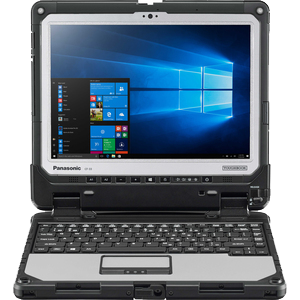The Panasonic rugged laptops are specially built for high-work demanding work environments custom-tailored to reduce system downtime and significantly improve the Return of Interest for businesses. It goes without saying that the test performed on the rugged machines are pretty extreme at times, like the ones described below. If you've ever looked for a new rugged computer, you've certainly come across a slew of different form factors and configurations, and narrowing down the ideal criteria may be a lengthy process. Perhaps you require a 5U MIL-STD-810 robust server with 18 PCIe slots or a 1U MIL-STD-461 tough workstation with 7th Generation Intel Core CPUs.
The same considerations apply when choosing a robust small PC or laptop. Naturally, you'll have questions regarding the CPUs, USB 3.0 ports, and LAN ports, among other things.
Many of the testing’s Panasonic Toughbook computers go through are quite similar, whether it's NEMA and IP ratings or MIL-STD-810 certifications. The following are a few examples:
● Drop and Shock Testing: A computer must withstand being dropped 26 times from a height of one foot onto its edge, face, and corners. Toughbook’s with a higher rating survives a similar test in which they are dropped 78 times from a height of four to six feet. Panasonic rugged laptops are drilled to the core to survive even after such abuse making up for the price point it sells for.
● Liquid Resistance Testing: A computer must be able to survive a variety of liquids, including spills and heavy rain. In a simulated rainstorm with gusts of up to 70 miles per hour, Panasonic laptops are left running for 30 minutes. Panasonic rugged laptops are priced in the range of 1 lakh to 3.5 lakh in India.
● Pressure Testing: The computer's casing must withstand 300 pounds of pressure over the surface during pressure testing. It must also retain operation for one hour at rising altitudes up to 15,000 feet. The rugged laptops from the house of Panasonic don’t succumb to even higher pressures than those mentioned in the testing criteria and easily perform reliably in such work conditions reducing significant system downtime.
● Vibration
Testing: This replicates the vibrations that a Panasonic Toughbook computer
could experience in everyday life. To confirm that the hard disc fulfills
vibration resistance criteria, the computer must be able to seamlessly play a
movie while being continuously shaken. This makes the rugged laptops from Panasonic
best for high demanding work conditions where other office-taking laptops would
crumble like a piece of paper.
● Humidity Testing: Toughbooks must be able to tolerate up to 95% humidity in the air, but they must also be able to work in extreme temperature variations.
● Temperature Testing: While the humidity test and the temperature test are similar, this test goes one step further. A Toughbook must be able to operate in temperatures ranging from 140°F to -20°F. When shut off, the computer must withstand temperatures of 160°F and -60°F.
These extreme tests performed give you the idea of what the Panasonic rugged laptops are built for. These rugged laptops from Panasonic also have very low maintenance costs but are priced relatively higher when compared to regular office-taking laptops.
Conversely, rugged industrial laptops from Panasonic save
the big bucks in the long run.
